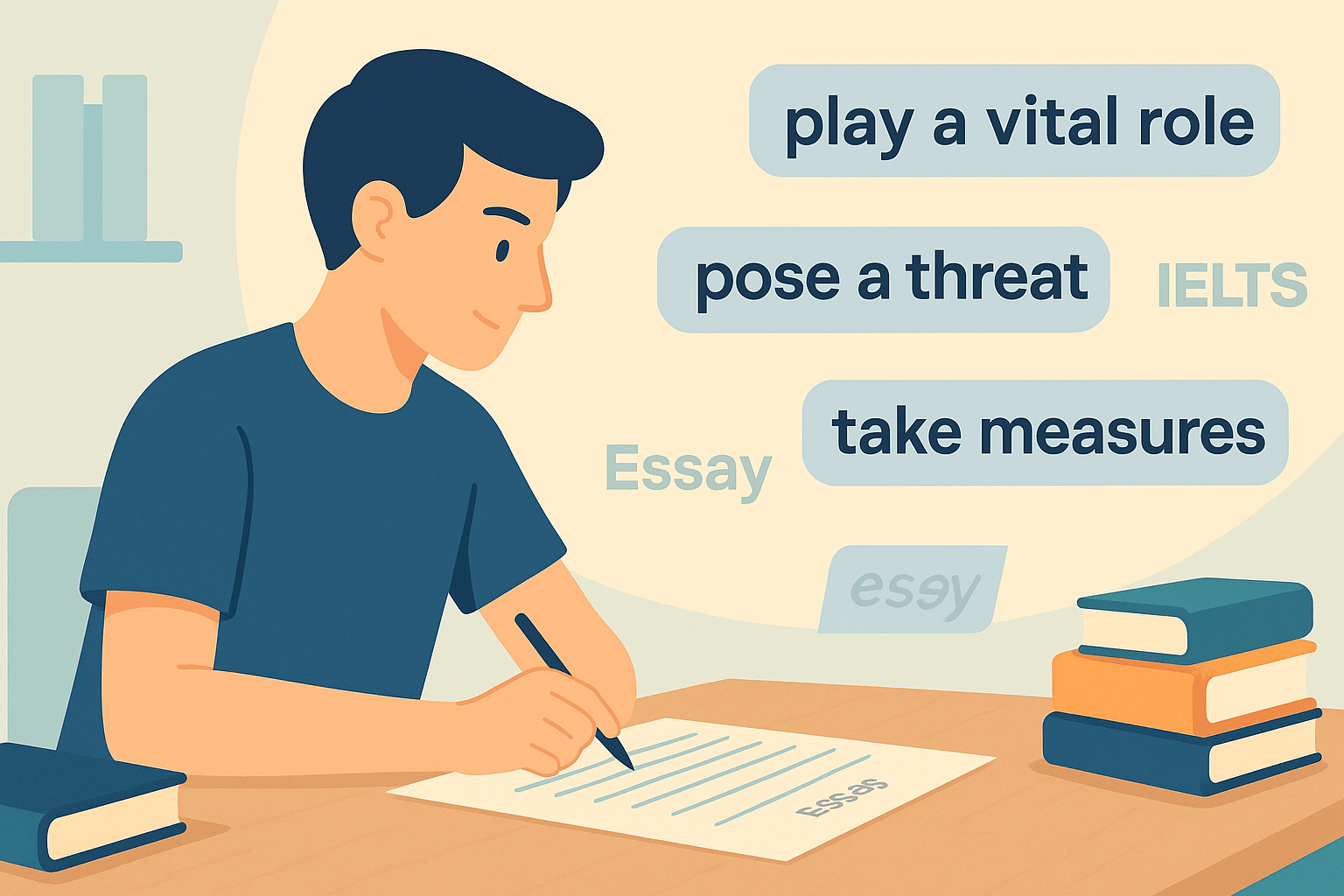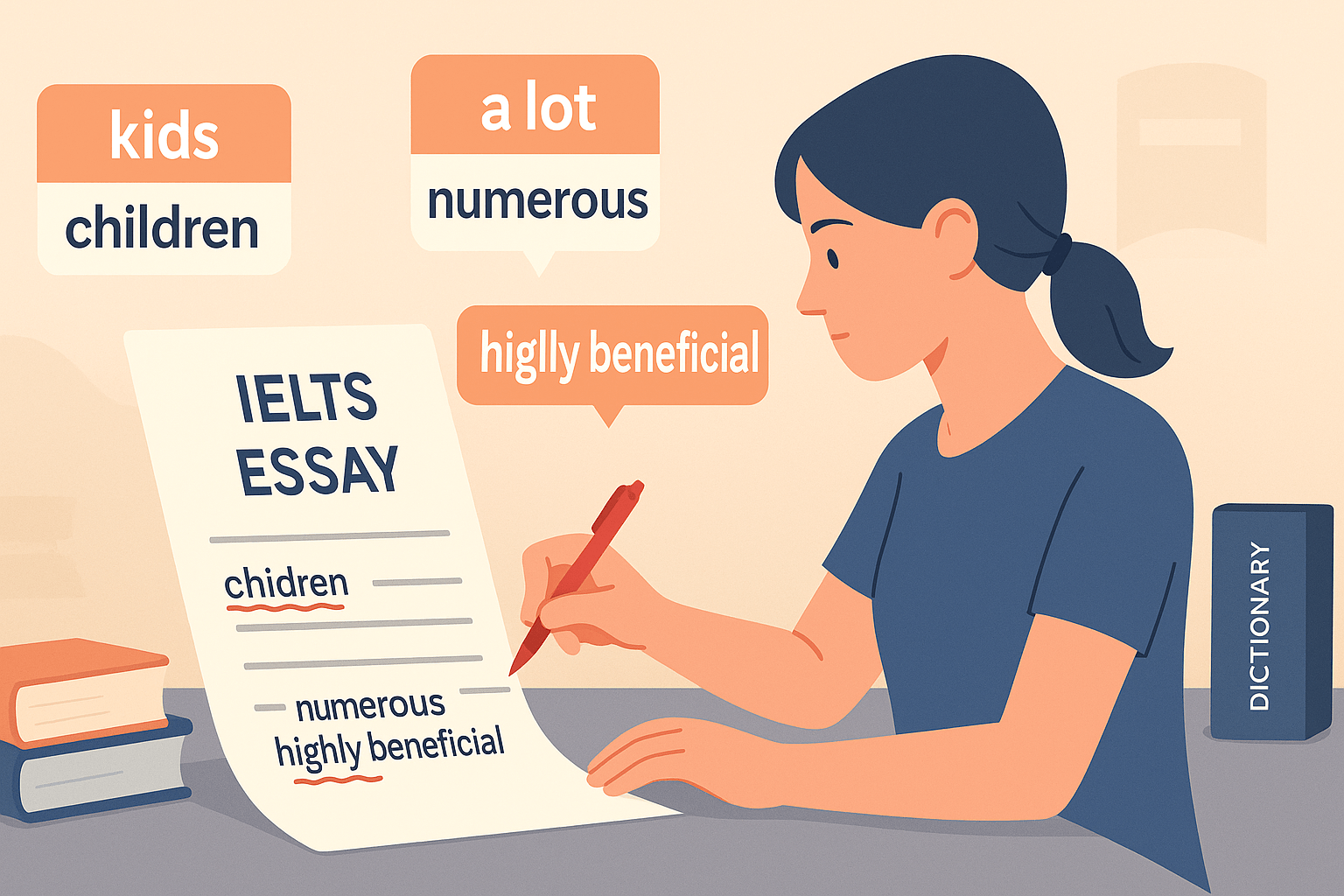When I coach IELTS students worldwide, one question I often hear is:
“How can I clearly explain reasons and outcomes in my Task 2 essays?”
The answer is to master IELTS cause and effect essay vocabulary—formal, academic words and connectors that help you:
- ✅ Explain causes logically
- ✅ Show effects and consequences clearly
- ✅ Make your essay cohesive and examiner-friendly
In this guide, I’ll share ready-to-use cause-and-effect vocabulary, collocations, and teacher tips to help you craft a Band 7–9 essay confidently.
Before we start, I recommend reading my IELTS Writing Task 2 Vocabulary for Band 7–9—it’s the pillar post for building formal writing vocabulary across all essay types.
Why IELTS Cause and Effect Essay Vocabulary Matters
Cause and effect essays are a common type of IELTS Writing Task 2 question.
Examiners expect you to:
- Explain why something happens (cause)
- Describe its results (effect)
- Use cohesive devices to link causes and outcomes
Without the right vocabulary:
- Your essay may sound too simple or informal
- Ideas may feel disconnected
- Your Lexical Resource and Coherence scores may drop
For official writing resources, check:
Essential IELTS Cause and Effect Essay Vocabulary
Here’s my teacher-approved vocabulary list for Task 2 cause and effect essays, divided into functional categories.
1. Vocabulary for Introducing Causes
When explaining why something happens, use formal alternatives instead of casual words like “because.”
- due to / owing to
- as a result of
- stems from / arises from
- attributable to
- triggered by
Example:
“Urban air pollution is largely caused by the overuse of private vehicles.”
2. Vocabulary for Presenting Effects or Results
When explaining outcomes or consequences, use these academic terms:
- consequence
- outcome
- implication
- repercussion
- impact
- effect
Phrases for effects:
- This leads to…
- As a result…
- Consequently…
- This results in…
- This has led to…
Example:
“Excessive smartphone use results in reduced attention spans among teenagers.”
3. Vocabulary for Cause-and-Effect Linking
Cohesive devices are essential for coherence and cohesion.
Use these connectors to link causes and effects:
- therefore
- thus
- hence
- consequently
- for this reason
Example:
“Factories release harmful emissions; therefore, air quality in cities deteriorates.”
4. IELTS Task 2 Cause Effect Essay Vocabulary for Solutions and Implications
When analyzing causes and effects, you often hint at solutions or implications:
- To address this issue…
- This situation can be mitigated by…
- If this trend continues, it may lead to…
- A possible consequence is…
Example:
“If global warming is not addressed, it may lead to more frequent extreme weather events.”
5. Academic Collocations for Consequences
To sound Band 7–9 ready, use collocations that show precision:
- adverse consequences
- inevitable outcome
- long-term implications
- severe impact
- positive effect
Example:
“Deforestation has long-term implications for biodiversity and climate stability.”
Teacher Tips for Using Cause and Effect Vocabulary
I’ve marked thousands of essays, and these are my top tips for boosting your writing score:
1. Avoid Repeating “Because” and “So”
❌ “People drive cars because it is easy, so cities are polluted.”
✅ “Urban pollution stems from the reliance on private cars, which results in poor air quality.”
2. Use Cause-and-Effect Chains for Cohesion
Create logical progressions:
“Fast food consumption leads to obesity, which in turn results in higher healthcare costs.”
This shows cohesion and improves your Coherence and Cohesion score.
3. Combine with Topic-Specific Vocabulary
Cause-and-effect vocabulary is powerful when paired with precise topics:
“Climate change arises from excessive greenhouse gas emissions, resulting in rising global temperatures.”
Sample Paragraph Using IELTS Cause and Effect Essay Vocabulary
“Air pollution in urban areas is a growing concern. This issue stems from the heavy use of private vehicles and the operation of industrial factories. As a result, citizens are facing increased respiratory problems, and the overall air quality continues to deteriorate. Consequently, local governments are under pressure to implement stricter environmental regulations.”
Notice how the paragraph:
- Clearly shows cause → effect → consequence
- Uses formal collocations and connectors
- Maintains logical flow
Quick Practice Exercise
Rewrite this informal sentence using IELTS cause and effect essay vocabulary:
“People throw rubbish on the street, so the city looks dirty.”
Suggested Answer:
“Littering in public spaces results in unsightly streets and contributes to urban cleanliness problems.”
FAQ Section
Q1: What is IELTS cause and effect essay vocabulary?
It is a collection of formal words and connectors to describe reasons, outcomes, and consequences in Task 2 essays.
Q2: How do I improve cause and effect writing in IELTS?
Use academic cause indicators like “stems from, arises from” and result connectors like “therefore, consequently.”
Q3: How many causes and effects should I include in my essay?
Typically one to two well-developed causes and their effects are enough for a Band 7–9 essay.
Conclusion
Mastering IELTS cause and effect essay vocabulary allows you to:
- Explain reasons and consequences formally
- Create cohesive and logical essays
- Boost your Lexical Resource and Coherence scores
When you:
- Use cause indicators like “arises from”
- Link outcomes with result connectors like “as a result”
- Highlight consequences with academic collocations
… you’ll write like a Band 7–9 candidate in Task 2.
🔗 Next: Strengthen your writing with our IELTS Writing Task 2 Vocabulary for Band 7–9 to achieve a higher band score.





